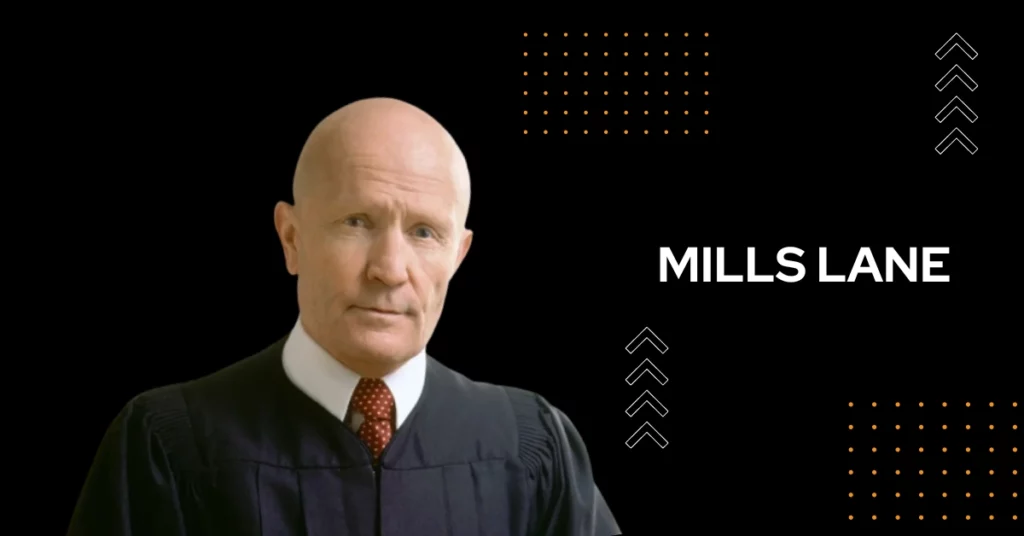Mills Lane, a collegiate boxing champion who narrowly missed being selected for the 1960 U.S. Olympic team and went on to have a career as a prosecutor, a two-term district attorney, a district court judge, and one of the best boxing referees in history, passed away early on Tuesday at a hospice close to his home in Reno, Nevada.
The Reno Gazette-Journal was informed by Tommy, Mills Lane’s son, that his father’s health had dramatically deteriorated recently. Twenty years ago, Lane had a crippling stroke that destroyed his career as a referee and rendered him speechless.
Tommy Lane said, “He took a major decrease in his whole status.” “The flight took off quickly. He was surrounded by his family and in a cozy environment.
Lane, a Marine, represented the United States at the 1960 U.S. Olympic Trials in San Francisco, California, after winning the NCAA welterweight boxing title that year. He dropped the semifinal match. He began fighting professionally while still a college student and, after losing his first match, went on to win ten fights before giving up.
Legendary boxing ref Mills Lane has died at 85 years old. https://t.co/btzguDNLP3
— TMZ (@TMZ) December 6, 2022
After two stints as Washoe County’s district attorney in Nevada, Mills Lane was appointed to the district court judge position in Washoe. Then, he presided over “The People’s Court-style” television program, where he heard civil cases.
But Lane’s reputation in the boxing world was mainly as a terrific referee. In the latter part of the 20th century, he officiated many of the biggest fights, including those between Muhammad Ali, Mike Tyson, Evander Holyfield, Lennox Lewis, and Riddick Bowe, among many others.
Let’s get it on! was his catchphrase for the opening of bouts, and it quickly gained notoriety and recognition.
Mills Lane was hailed by Richard Steele, another legendary official, as “one of the best referees ever,” according to Yahoo Sports. “Mills had excellent judgment and always made the appropriate decisions, never too early or late. He was always going one way. He lacked ambiguity. He was commanding, decisive, and reliable. He had been in the Marine Corps and used the same terminology. We used to talk about always needing to be strong, authoritative, and in charge while we were both in the Marines. He was a big part of my development as a referee. He was an excellent individual who was fair and honest. He will be missed, guy. I am.
Mills Lane officiated the “The Bite Fight” rematch between Holyfield and Tyson, which took place at the MGM Grand Garden in Las Vegas on June 28, 1997. Tyson was upset with the refereeing of Mitch Halpern, whom he accused of allowing Holyfield to headbutt him after Tyson had defeated Holyfield at the MGM Grand eight months earlier to win the title.
Halpern was rehired to cover the rematch, but when the Tyson camp argued, he withdrew to avoid being mentioned in the media. After taking his place, Lane was forced to try to maintain order after Tyson bit Holyfield in the ear in the third round.
Marc Ratner was the Nevada Athletic Commission’s executive director before becoming a UFC executive. When Tyson first bit Holyfield, Lane immediately disqualified him. Are you sure? Ratner questioned Lane as he rose to his feet on the ring platform. The conflict was subsequently permitted to continue by Mills Lane.
Ratner told Yahoo Sports that when he asked the referee if he was sure, he “used to tell all my referees to think” and then made up his mind. He handled that crazy scenario about as well as he could have.
In several challenging or odd matches, Mills Lane served as the referee. When paraglider James Miller flew into the ring and tangled in the ropes during the game in 1993, he worked the rematch between Bowe and Holyfield for the undisputed heavyweight title. On February 7, 1997, he performed the rematch between Oliver McCall and Lewis at the Las Vegas Hilton. In the middle of the battle, McCall suffered a mental collapse and started sobbing. Lewis won by technical knockout after Mills Lane called time on the contest.
Additionally, he was forced to eject Henry Akinwande from a fight with Lewis in 1997 at Caesars Tahoe because Akinwande continued to hold and exhibit extreme passivity.
Mills Lane was the referee for a middleweight title fight between Robert Allen and Bernard Hopkins on August 28, 1998, at the Las Vegas Hilton. Hopkins fell and rolled out of the ring as Lane attempted to break up the final instance of holding during the fight. He suffered an ankle injury and could not continue, so the match was declared a no-contest.
Ratner mockingly referred to those matches as “the Grand Slam of weirdness.”
But Mills Lane handled things as well as could be expected.
Ratner remarked that the man “was one of the most unusual people I’ve ever met.” He was a firm believer in law and order, but he was also a great person I enjoyed talking to and spending time with. He was a no-nonsense referee, and despite his slight build, when he gave orders or told the fighters to break, they did so out of respect for him.
“I was fortunate to have Mills Lane, Richard, and Joe [Cortez] during my tenure as the commission’s executive director. They are three of the all-time best referees and members of the Hall of Fame. I had good luck finding men to use in my essential battles.
The International Boxing Hall of Fame inducted Mills Lane in 2013.
